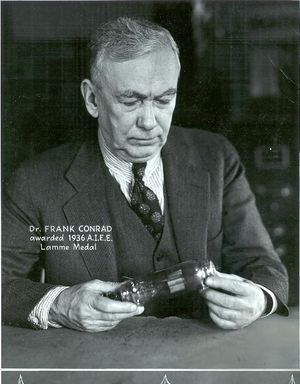Frank Conrad: Difference between revisions
(Conrad helped Westinghouse found the first broadcasting station.) |
m (Text replace - "[[Category:Power, energy & industry application|" to "[[Category:Power, energy & industry applications|") |
||
| (19 intermediate revisions by 3 users not shown) | |||
| Line 1: | Line 1: | ||
== | == Biography == | ||
[[Image:Conrad.jpg|thumb|right]] | |||
[[Image:Conrad Tube 1142a.jpg|thumb|right]] | |||
Born: 4 May 1874<br>Died: 10 December 1941 | |||
Frank Conrad, was born in Pittsburgh on 4 May 1874. He was widely known as the father of commercial radio broadcasting. In 1890, at age 16, young Conrad quit school to work as a bench hand with the Westinghouse Electric and Manufacturing Company, his life-long employer. Seven years later he had given the world his first important contribution, the round type electric meter now in general use. | Frank Conrad, was born in Pittsburgh on 4 May 1874. He was widely known as the father of commercial radio broadcasting. In 1890, at age 16, young Conrad quit school to work as a bench hand with the Westinghouse Electric and Manufacturing Company, his life-long employer. Seven years later he had given the world his first important contribution, the round type [[Electric Meter|electric meter]] now in general use. | ||
He became interested in the time signals sent out by the Naval radio station at Arlington, and developed a crude radio receiving set from which he advanced to his own sending set. His experimentation with radio transmitting in 1919 and earlier helped Westinghouse found station [[KDKA, First Commercial Radio Station|KDKA]], the [[Milestones:Westinghouse Radio Station KDKA, 1920|world's pioneer broadcasting station]]. During World War I he devised special airplane radio apparatus and improved existing hand grenade designs. | |||
During his 51 years with Westinghouse, Conrad received over 200 American, English, and German patents on mechanical and electrical devices such as refrigerators, carburetors, radio transmitters and receivers, televisions, clocks, [[Arc Lighting|arc lamps]], gear shifts, air conditioners, insulators, [[Electron (or Vacuum) Tubes|vacuum tubes]], and electric meters. He was also awarded many honorary degrees and medals for his scientific achievement, among them the IRE Morris Liebman Prize in 1925, the [[IEEE Edison Medal|AIEE Edison Medal]] in 1930 'For his contributions to radio broadcasting and short wave radio transmission', and the [[IEEE Lamme Medal|AIEE Lamme Medal]] in 1936. He was inducted in the Radio Hall of Fame in 1953. | |||
Dr. Conrad was married, to the former Flora Selheimer, and had two sons and a daughter. He died on 10 December 1941, at the age of 67, in Miami, Florida. | |||
== Further Reading == | |||
[[Archives:Papers of Frank Conrad|Papers of Frank Conrad]] - correspondence and records, 1902 - 1941 | |||
[[Category:Power, energy & industry applications|Conrad]] [[Category:Components, circuits, devices & systems|Conrad]] [[Category:News|Conrad]] | |||
[[Category: | |||
Revision as of 13:49, 13 November 2013
Biography
Born: 4 May 1874
Died: 10 December 1941
Frank Conrad, was born in Pittsburgh on 4 May 1874. He was widely known as the father of commercial radio broadcasting. In 1890, at age 16, young Conrad quit school to work as a bench hand with the Westinghouse Electric and Manufacturing Company, his life-long employer. Seven years later he had given the world his first important contribution, the round type electric meter now in general use.
He became interested in the time signals sent out by the Naval radio station at Arlington, and developed a crude radio receiving set from which he advanced to his own sending set. His experimentation with radio transmitting in 1919 and earlier helped Westinghouse found station KDKA, the world's pioneer broadcasting station. During World War I he devised special airplane radio apparatus and improved existing hand grenade designs.
During his 51 years with Westinghouse, Conrad received over 200 American, English, and German patents on mechanical and electrical devices such as refrigerators, carburetors, radio transmitters and receivers, televisions, clocks, arc lamps, gear shifts, air conditioners, insulators, vacuum tubes, and electric meters. He was also awarded many honorary degrees and medals for his scientific achievement, among them the IRE Morris Liebman Prize in 1925, the AIEE Edison Medal in 1930 'For his contributions to radio broadcasting and short wave radio transmission', and the AIEE Lamme Medal in 1936. He was inducted in the Radio Hall of Fame in 1953.
Dr. Conrad was married, to the former Flora Selheimer, and had two sons and a daughter. He died on 10 December 1941, at the age of 67, in Miami, Florida.
Further Reading
Papers of Frank Conrad - correspondence and records, 1902 - 1941
